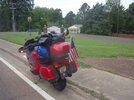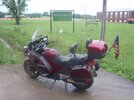Start with a City beginning with A
- This is BY STATE
- Similar to the Tag contest, there will be one thread per state
- Post a picture of your bike AND some sign, building etc which clearly shows the city/state you're in
- The next person posts from a city with the name beginning with B, then C, D, etc
- You can't posts back-to-back pics, you have to wait for a person to post the next city
- Once Z is reached, the game starts over with A
- If your state doesn't have a city beginning with the next letter in sequence, it's okay to skip that letter
- If the location sits for more than one month, the person that posted that is open to move it to the next letter.
The
World Wide game is a bit different as it is by whatever is considered a geographic type of regional category, state/province/village etc. and all those will be in the single World Wide A-Z topic.

![20240429_115748[1].jpg 20240429_115748[1].jpg](https://www.st-owners.com/forums/data/attachments/199/199447-86375647a9b4f9aab0c68fe1aa104515.jpg)
![20240429_115801[1].jpg 20240429_115801[1].jpg](https://www.st-owners.com/forums/data/attachments/199/199448-d14f5893db0540b70b5e811702a2d143.jpg)






